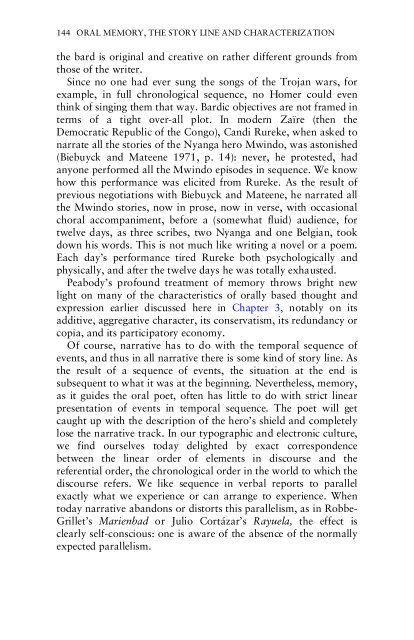Orality and Literacy: The Technologizing of the Word - Monoskop
Orality and Literacy: The Technologizing of the Word - Monoskop
Orality and Literacy: The Technologizing of the Word - Monoskop
You also want an ePaper? Increase the reach of your titles
YUMPU automatically turns print PDFs into web optimized ePapers that Google loves.
144 ORAL MEMORY, THE STORY LINE AND CHARACTERIZATION<br />
<strong>the</strong> bard is original <strong>and</strong> creative on ra<strong>the</strong>r different grounds from<br />
those <strong>of</strong> <strong>the</strong> writer.<br />
Since no one had ever sung <strong>the</strong> songs <strong>of</strong> <strong>the</strong> Trojan wars, for<br />
example, in full chronological sequence, no Homer could even<br />
think <strong>of</strong> singing <strong>the</strong>m that way. Bardic objectives are not framed in<br />
terms <strong>of</strong> a tight over-all plot. In modern Zaïre (<strong>the</strong>n <strong>the</strong><br />
Democratic Republic <strong>of</strong> <strong>the</strong> Congo), C<strong>and</strong>i Rureke, when asked to<br />
narrate all <strong>the</strong> stories <strong>of</strong> <strong>the</strong> Nyanga hero Mwindo, was astonished<br />
(Biebuyck <strong>and</strong> Mateene 1971, p. 14): never, he protested, had<br />
anyone performed all <strong>the</strong> Mwindo episodes in sequence. We know<br />
how this performance was elicited from Rureke. As <strong>the</strong> result <strong>of</strong><br />
previous negotiations with Biebuyck <strong>and</strong> Mateene, he narrated all<br />
<strong>the</strong> Mwindo stories, now in prose, now in verse, with occasional<br />
choral accompaniment, before a (somewhat fluid) audience, for<br />
twelve days, as three scribes, two Nyanga <strong>and</strong> one Belgian, took<br />
down his words. This is not much like writing a novel or a poem.<br />
Each day’s performance tired Rureke both psychologically <strong>and</strong><br />
physically, <strong>and</strong> after <strong>the</strong> twelve days he was totally exhausted.<br />
Peabody’s pr<strong>of</strong>ound treatment <strong>of</strong> memory throws bright new<br />
light on many <strong>of</strong> <strong>the</strong> characteristics <strong>of</strong> orally based thought <strong>and</strong><br />
expression earlier discussed here in Chapter 3, notably on its<br />
additive, aggregative character, its conservatism, its redundancy or<br />
copia, <strong>and</strong> its participatory economy.<br />
Of course, narrative has to do with <strong>the</strong> temporal sequence <strong>of</strong><br />
events, <strong>and</strong> thus in all narrative <strong>the</strong>re is some kind <strong>of</strong> story line. As<br />
<strong>the</strong> result <strong>of</strong> a sequence <strong>of</strong> events, <strong>the</strong> situation at <strong>the</strong> end is<br />
subsequent to what it was at <strong>the</strong> beginning. Never<strong>the</strong>less, memory,<br />
as it guides <strong>the</strong> oral poet, <strong>of</strong>ten has little to do with strict linear<br />
presentation <strong>of</strong> events in temporal sequence. <strong>The</strong> poet will get<br />
caught up with <strong>the</strong> description <strong>of</strong> <strong>the</strong> hero’s shield <strong>and</strong> completely<br />
lose <strong>the</strong> narrative track. In our typographic <strong>and</strong> electronic culture,<br />
we find ourselves today delighted by exact correspondence<br />
between <strong>the</strong> linear order <strong>of</strong> elements in discourse <strong>and</strong> <strong>the</strong><br />
referential order, <strong>the</strong> chronological order in <strong>the</strong> world to which <strong>the</strong><br />
discourse refers. We like sequence in verbal reports to parallel<br />
exactly what we experience or can arrange to experience. When<br />
today narrative ab<strong>and</strong>ons or distorts this parallelism, as in Robbe-<br />
Grillet’s Marienbad or Julio Cortázar’s Rayuela, <strong>the</strong> effect is<br />
clearly self-conscious: one is aware <strong>of</strong> <strong>the</strong> absence <strong>of</strong> <strong>the</strong> normally<br />
expected parallelism.

















